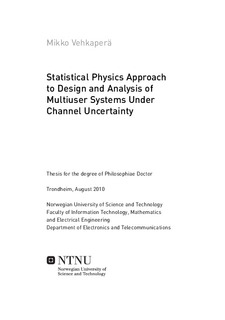| dc.contributor.advisor | Müller, Ralf | nb_NO |
| dc.contributor.author | Vehkaperä, Mikko | nb_NO |
| dc.date.accessioned | 2014-12-19T13:42:53Z | |
| dc.date.accessioned | 2015-12-22T11:40:10Z | |
| dc.date.available | 2014-12-19T13:42:53Z | |
| dc.date.available | 2015-12-22T11:40:10Z | |
| dc.date.created | 2010-09-01 | nb_NO |
| dc.date.issued | 2010 | nb_NO |
| dc.identifier | 346499 | nb_NO |
| dc.identifier.isbn | 978-82-471-2258-7 | nb_NO |
| dc.identifier.uri | http://hdl.handle.net/11250/2368898 | |
| dc.description.abstract | Code-division multiple-access (CDMA) systems with random spreading and channel uncertainty at the receiver are studied. Frequency selective single antenna, as well as, narrowband multiple antenna channels are considered. Rayleigh fading is assumed in all cases. General Bayesian approach is used to derive both iterative and non-iterative estimators whose performance is obtained in the large system limit via the replica method from statistical physics.
The effect of spatial correlation on the performance of a multiple antenna CDMA system operating in a flat-fading channel is studied. Per-antenna spreading (PAS) with random signature sequences and spatial multiplexing is used at the transmitter. Non-iterative multiuser detectors (MUDs) using imperfect channel state information (CSI) are derived. Training symbol based channel estimators having mismatched a priori knowledge about the antenna correlation are considered. Both the channel estimator and the MUD are shown to admit a simple single-user characterization in the large system limit. By using the decoupled channel model, the ergodic spectral efficiency with single-user decoding and quarternary phase shift keying (QPSK) constrained modulation is derived. In contrast to the case of perfect CSI where transmit correlation has no effect on the ergodic system performance with random PAS, the results show that with channel estimation the ergodic capacity can improve significantly as the correlations between the transmit antennas increase. This requires that the channel estimator knows the correct long term spatial correlation in advance, while no information is required at the transmitter.
Iterative multiuser receivers for randomly spread CDMA over a frequency selective Rayleigh fading channel are analyzed. General Bayesian approach for iterative channel estimation and data detection and decoding is proposed. Both linear and non-linear iterative schemes are considered with soft or hard information feedback. The equivalent single-user representation of the system is derived in the large system limit via the replica method. The decoupled single-user channel, and density evolution with Gaussian approximation are used to obtain the spectral efficiency and bit error rate (BER) of the system using bit-interleaved coded modulation (BICM) and Gray encoded QPSK mapping. The results indicate that in the large system limit and under certain threshold loads, near single-user BER performance with perfect CSI can be achieved by using a vanishing training overhead. This requires, however, an iterative receiver using soft feedbacks only. For relatively slowly time-varying multipath fading channels, the iterative linear minimum mean square error (LMMSE) based channel estimator is also shown to be near optimal in terms of maximizing the spectral efficiency of the system when combined with iterative LMMSE or maximum a posteriori multiuser detectors.
A novel training method based on probability biased signaling is proposed. By assuming an entropy maximizing biasing scheme and standard BICM, it is shown via numerical examples that the proposed training method can offer superior performance over the conventional training symbol based approach when combined with iterative receivers. | nb_NO |
| dc.language | eng | nb_NO |
| dc.relation.ispartofseries | Doctoral Theses at NTNU, 1503-8181; 2010:145 | nb_NO |
| dc.title | Statistical Physics Approach to Design and Analysis of Multiuser Systems Under Channel Uncertainty | nb_NO |
| dc.type | Doctoral thesis | nb_NO |
| dc.source.pagenumber | 192 | nb_NO |
| dc.contributor.department | Norges teknisk-naturvitenskapelige universitet, Fakultet for informasjonsteknologi, matematikk og elektroteknikk, Institutt for elektronikk og telekommunikasjon | nb_NO |
